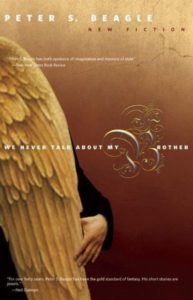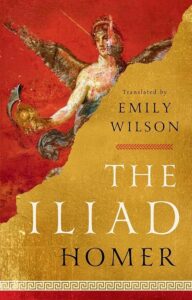The more my eyes went up and down the list of books I read in 2023, the more they came to rest on We Never Talk About My Brother by Peter S. Beagle. The call from Stockholm doesn’t come for people who publish books with titles like Lila the Werewolf or The Innkeeper’s Song, but looking on the one hand at the works of Orhan Pamuk, or Olga Tokarczuk, or the prose of Czeslaw Milosz, and Beagle’s writings such as Summerlong, “Two Hearts,” and, yes, The Last Unicorn, I’d be hard pressed to say why not. I haven’t read any of Mo Yan’s work, but his citation notes “who with hallucinatory realism merges folk tales, history and the contemporary,” and if that’s not Peter S. Beagle to a T, I don’t know what is. Anyway, Beagle’s best really is that good, and I need to read more of his work that I’ve missed.
Two more books that made me smile every time I thought back on them are The Red Prince by Timothy Snyder and Silver in the Wood by Emily Tesh. One is a non-fiction story of an improbable prince, and how he bobbed on the currents of history, the other is a splendid tale of people and deep magic. They have their commonalities, but mainly they’re simply terrific at what they are.
Early in 2023 I said good-bye to Erast Fandorin, at least for the first read-through. I’ve been reading this series about Russia’s Sherlock Holmes since the early 2000s, and I think it’s terrific. I wish it had a bigger audience in English. By spring I also came to the end of my reading of Seamus Heaney’s main collections. I was inspired by a great collection of interviews between Heaney and Dennis O’Driscoll, in a volume that’s the closest thing to an autobiography that Heaney left behind. Without really realizing it, I read six of the current thirteen Rivers of London books this year. Three were novellas — The October Man, The Furthest Station, and What Abigail Did That Summer, so they went down easy, and also expanded the series beyond Peter Grant and what befalls him at the Folly. I saw Mary Robinette Kowal do a reading at a local Berlin bookstore. She was great! I picked up several of her books, and I think I’ve read all of her major works now. I’m looking forward to the next novel in the Lady Astronauts series, which is what she read from in Berlin; its publication is scheduled for 2024.
This year I read eight books in German, exceeding for the first time in a long time my general rule of thumb that about 10 percent of my reading is auf Deutsch. Some were short, some were comics or pointed charts, and one weighed in at about a thousand pages, though I read the first half 30 years ago and did not go back to the beginning when I finished it. As balance of a sort, though not deliberately, I read about half as many works in translation in 2023 as I did in 2022: Polish to English was again the most common with three, two by the amazing Jozef Czapski; one from Russian into English; one from Estonian into German; one from French into German; and one from Ancient Greek into modern English for a total of seven.
My only re-read this year was a look back at a classic portrait of Joe Biden in the 1988 presidential election, part of the epic What It Takes by Richard Ben Cramer. I read three volumes of poetry: Seamus Heaney‘s last two major collections and Emily Wilson’s new translation of The Iliad. Seventeen books I read this year were by women (counting The Iliad for Wilson rather than Homer), and 41 were by men.
Best pop culture insider Thing, even if it’s from more than 50 years ago: Eve’s Hollywood by Eve Babitz. Best advocate for finally attempting some Proust: Lost Time by Jozef Czapski. Best depiction of a querulous, self-aggrandizing knight of the Polish-Lithuanian Commonwealth: Memoirs of the Polish Baroque by Jan Chryzostom Pasek. Best instruction of what to do if you have two lieutenants in your wardrobe: Mitsou by Colette. Best “What I Did On My Summer Vacation” (Weimar Republic edition): Schloss Gripsholm by Kurt Tucholsky. Best body-strewn epic: The Iliad translated by Emily Wilson. Best German cartoons: Wofür sich Frauen rechtfertigen müssen by Katja Berlin.
Full list, roughly in order read, is under the fold with links to my reviews and other writing about the authors here at Frumious.
The Romanovs by Simon Sebag Montefiore
Not Saying Goodbye by Boris Akunin
Cold Water by Dave Hutchinson
District and Circle by Seamus Heaney
We Never Talk About My Brother by Peter S. Beagle
The Kaiju Preservation Society by John Scalzi
The Red Scholar’s Wake by Aliette de Bodard
The Historian by Elizabeth Kostova
A History of Iran by Michael Axworthy
The Red Prince by Timothy Snyder
Phoenix Extravagant by Yoon Ha Lee
Human Chain by Seamus Heaney
The October Man by Ben Aaronovitch
What It Takes by Richard Ben Cramer
Station Eternity by Mur Lafferty
Chernobyl by Serhii Plokhy
Silver in the Wood by Emily Tesh
Der blaue Himmel by Galsan Tschinag
Wofür sich Frauen rechtfertigen müssen by Katja Berlin
Broken Homes by Ben Aaronovitch
What If? 2 by Randall Munroe
Sandman: The Wake written by Neil Gaiman
Forest of Memory by Mary Robinette Kowal
Black Water Sister by Zen Cho
Legends & Lattes by Travis Baldree
The Story of Russia by Orlando Figes
The Ten Percent Thief by Lavanya Lakshminarayan
The Way Home by Peter S. Beagle
Ghost Talkers by Mary Robinette Kowal
Der Verrückte des Zaren by Jaan Kross
The City of Brass by S.A. Chakraborty
Drowned Country by Emily Tesh
Father Under Fire by Neil Boyd
Die Känguru Comics written by Marc-Uwe Kling
The Education of an Idealist by Samantha Power
Foxglove Summer by Ben Aaronovitch
Terry Pratchett: A Life with Footnotes by Rob Wilkins (Terry Pratchett)
The Spare Man by Mary Robinette Kowal
Katrina: A History, 1915–2015 by Andy Horowitz
Der Zauberberg by Thomas Mann
Memoirs of the Polish Baroque by Jan Chryzostom Pasek
The Furthest Station by Ben Aaronovitch
Lost Time by Jozef Czapski
Schloss Gripsholm by Kurt Tucholsky
Mitsou by Colette
The Sleeper and the Spindle written by Neil Gaiman
What Abigail Did That Summer by Ben Aaronovitch
The Destroyer of Worlds by Matt Ruff
Eve’s Hollywood by Eve Babitz
The Portable Door by Tom Holt
Memories of Starobielsk by Jozef Czapski
Underground Empire by Henry Farrell and Abraham Newman
The Hanging Tree by Ben Aaronovitch
Die Känguru-Comics 2 written by Marc-Uwe Kling
System Collapse by Martha Wells
The Iliad translated by Emily Wilson
Breakfast at Tiffany’s by Truman Capote
The Narrow Road between Desires by Patrick Rothfuss
Lagniappe
Remembering Laura
Süddeutsche Series


